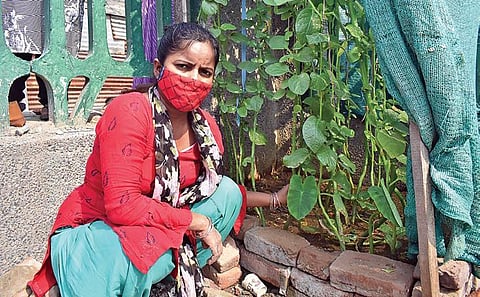

Unlike most residents of the Bhalswa JJ Colony in North-West Delhi, Moina (21) has converted a part of her terrace into a vegetable garden. Here, she grows Malabar Spinach, Ridge Gourd, Eggplant, Coriander, and Green Chillies, for her family. “This reminds me of my village in Kolkata,” she says.
A few lanes away, you’ll find Ambiba Bibi (32), a waste-picker who reaches home from work only to go straight to scanning the plants she has been growing since the first lockdown relaxation in November last year. “I treat these plants like my own children,” she says.
For Usha Devi (35), who lives two shanties away from Ambiba, the Malabar Spinach plant she planted three months ago has been producing enough seeds. “Once they are ripe, I pluck the seeds, cook a dish, and take it for my friends at work. They really like Poi ka Saag (Malabar Spinach).”
Moina, Usha, and Ambiba Bibi are a few of the several families in the Bhalswa Dairy region of North-West Delhi who have started growing vegetables in and around their homes. They’ve been successful in doing so with assistance from Delhi-based NGO, Chintan Environmental Research and Action Group. The project is an attempt to address the issue of poor nutrition among Delhi’s urban poor while also helping them find an alternative source of livelihood by growing vegetables.
Driving change
In November 2020, Chintan conducted a survey in the Capital to gauge the viability of setting up vegetable gardens in parts of the city. Once the survey was completed, and a scope to grow vegetables with the surveyed women was identified, Chintan trained the women with the help of an experienced farmer. Currently running in areas of Mahipalpur, Wazirabad, and Bhalswa Dairy, this project has inducted over 700 residents.
Bharati Chaturvedi, founder and director of Chintan, says, “It is a dispiriting thing given these women contribute so much to our city and are yet hungry. These gardens helped them [the families] get benefits.”
The project is at the intersection of poverty, women’s empowerment, and climate change. Since the working environment of these women are unsanitary, we wanted to ensure a mechanism that provides them with nutrition and alternative livelihoods, shares Shruti Sinha, Manager of Policy and Outreach at Chintan.
In the first planting season (March to April), they were provided seeds of Pumpkin, Spinach, Ridge Gourd, and Chilli. During the second season (July and August), they grew Malabar Spinach, Lal Chaulai (Red Amaranthas), Bottle Gourd, and Spinach.
The families here have been growing these seeds on their terraces and in front of their shacks. Covered with mosquito nets, old dupattas, or tarpaulin sheets that they find in the waste, these women try to keep the crops safe from rodents. “My children are able to eat to their heart’s content because of the vegetables we grow in our houses. This has also helped me protect my children from diseases,” concludes Shehnaaz, who has been living in Delhi for the last 15 years.